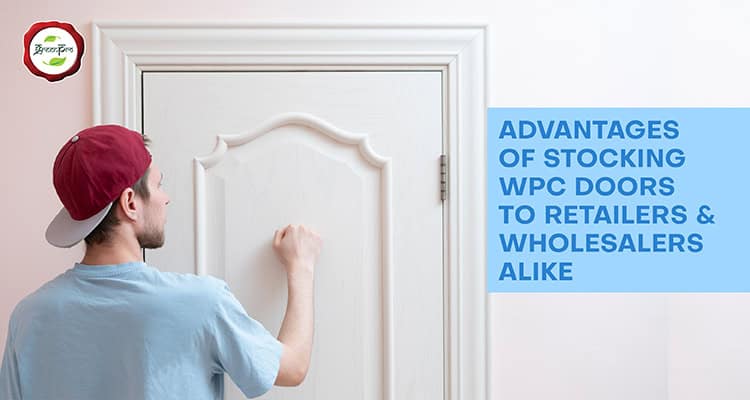One of the breakthrough products in the ever-changing world of building materials has been Wood Plastic Composite, or WPC, doors. For retail and wholesale building and home improvement stores, the challenge in carrying WPC doors is that it represents an opportunity to grow a new market but gives the customer a far better product offering.
Knowing the WPC Door Market
Before jumping right into the advantages, there first needs to be known the current market environment for WPC doors:
1. Filling the Demand for Environmentally Friendly Product
The best advantage of selling WPC doors is the increasing number of eco-sensitive customers, which can be catered to using these doors.
– Recyclable: Many WPC doors are recycled from plastic, as well as from wood fibers. Therefore, this creates an attraction for environment-friendly consumers.
– Long Lifetime: WPC doors are resilient, hence less replacement is required, which means fewer resources are consumed in the long term.
– Energy Efficiency: WPC doors generally offer better insulation, thus there are energy-efficient house designs.
By selling these products, retailers and wholesalers position themselves to take on all the limelight as distributors of green building solutions, which they can market for business gain.
2. Offering Better Product Attributes
WPC doors possess some attributes that make them preferred over other conventional variants:
END
– Water Resistance: For bathrooms, basements or any region that is moist or full of humidity and moisture.
– Stability: No warped, non-cracked, nor prone to pests which results in low instances of customer complaints and return rates.
– Low Maintenance: Saves labor for busy consumers, an attractive characteristic to time-poor modern consumers.
– Aesthetic Versatility: Offers a wide variety of colors and textures and can easily be designed to replicate the appearance of various wood grains.
All these factors mean that retailers and wholesalers can supply a product that addresses multiple consumer pain points at once.
3. Higher Profit Margins
While WPC doors cost more than equal traditional substitutes, these value-engineered products unlock enormous profit margins,
– Premium Price: Of course, the extra features of WPC doors command a premium price,
– Upsell Options: Retailers can sell WPC doors with companion items, such as specialty hardware or finishes.
– Fewer Repairs and Complaints: The long-lasting and reliable nature of WPC doors means fewer complaints from customers therefore no contraction in profit lines.
4. Differentiate Yourself From Competition
In a commoditized market, having WPC doors in inventory can be the point of differentiation for a business:
– New Frontier Product Line: Be on the vanguard of new building materials in your geography.
– Leader in Skill Building: Be one of the leaders in the emerging product category that your business is an expert in.
Luring new customer groups. WPC doors attract the eco-sensitized customer and high-end builders targeting premium quality.
5. Year Round Sales Opportunity
Unlike a seasonal building product WPC doors provide constant sales opportunities in all seasons of the year:
Weather-Resistant Product: Can be installed in any season.
Indoor and Outdoor Use: WPC doors find use as indoor door and exterior entry doors.
Remodeling Industry: Suitable for remodeling of homes, which is also a year-round opportunity.
This consistency of demand may further stabilize the inventory and sales forecasts.
6. Streamlined Inventory Management
Inventory processes pertaining to the stocking of WPC doors can be streamlined in the following:
Longer Shelf Life: Non-degradable during storage, with fewer write-offs due to damage.
Consistent Quality: Lesser variation with regard to product quality than natural wood products.
Reduced Storage Requirements: Does not require climate-controlled storage, as may be necessary in some wooden door products.
7. Satisfaction of Customer Building
Customers satisfied at one point in time ensure repeat business as well as mouth publicity. Doors made of WPC ensure customer satisfaction for the following reasons:
– Availability for Customization: A large number of WPC doors are easy to customize. Hence, retailers can very well provide tailor-made solutions.
– Warranty Support: WPC is generally more durable and ensures extended warranty periods, giving the clients a trouble-free guarantee.
8. Alignment with Building Code Trends
Building codes still continue to evolve towards more energy efficiency and being oriented towards sustainability. WPC doors offer great opportunity in that area because:
– Energy Standards: Most of the WPC doors meet or exceed the energy efficiency standards.
– Fire Resistance: Some formulations of WPC provide higher levels of fire resistance than traditional wooden doors.
– Accessibility Features: Uniform sized WPC doors prove to be ADA compliant ready for installations.
Stocking such products would position the retailers and wholesalers as a pace-setter in regulatory trends.
9. Capturing Marketing Opportunities
The unique selling points of WPC doors may be touted on marketing campaigns:
Sustainability Stories: Take the green side of the WPC door as part of the marketing campaign.
Performance Demonstrations: Display the durability and weather resistance of the WPC door through in-store displays.
Educational Content: Advise customers on the value proposition of WPC: educate your customers on why WPC is a great product to work with, in such a way that your company becomes regarded as an expert in the industry.
Conclusion
WPC door stocking is not just about the increase of another product in the inventory list; it is a decision that places your business among the leaders of innovation in building materials. Whether one prefers not to be bothered with how consumers’ needs would be met for sustainable high-performance products or simplifies processes and thus maximizes profit margins, there’s an advantage in all.
Business opportunities exist for both the retailer and wholesaler markets, as WPC doors provide an efficient means of demarcation in an increasingly competitive market. It grants businesses the chance to respond to changes that may be occurring with the customer, align with regulatory shifts, and also conform to a more sustainable building application.
